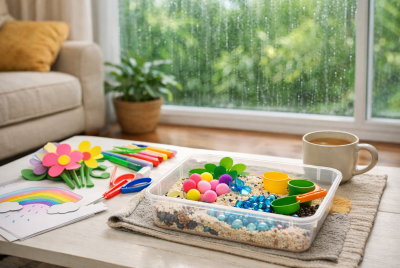The New Age of Endless Parenting: What You Need to Know
We may earn a commission for purchases made using our links. Please see our disclosure to learn more.
Parenting used to have a finish line. Once a child turned 18, it was generally assumed they’d venture into adulthood. But the new age of endless parenting is rewriting that script. More and more parents are finding themselves supporting adult children well into their 20s, 30s, and beyond.
This shift isn’t just about empty nests staying full. It’s a reflection of deeper changes in our economy, culture, and emotional expectations. Let’s break it all down.
Introduction: Parenting No Longer Ends at 18
The term “endless parenting” describes a reality many families now face: adult children still relying on their parents for financial help, emotional support, and even daily guidance. Whether it’s due to housing costs, job market struggles, or mental health concerns, today’s young adults often stay closely tethered to the family home.
While this might feel frustrating or confusing to some, it’s also a natural response to complex societal shifts. Understanding it is the first step to managing it.
What’s Fueling the Rise of Endless Parenting?
Economic Pressures
Let’s face it: adulting is expensive. With rising rent, tuition debt, and a competitive job market, many young adults are stuck. Parents often step in to help bridge the financial gaps, which makes sense—but it can extend dependency far longer than in past generations.
Shifting Social Norms
Gone are the days when moving out at 18 was a given. Today’s culture places more value on emotional wellbeing, taking one’s time, and even rethinking traditional timelines for marriage, career, and independence.
The Digital Dependency Era
Technology has made it easier for families to stay connected, but sometimes too connected. Constant texts, FaceTimes, and social media touchpoints can blur the lines between guidance and over-involvement.

The Emotional and Financial Impact on Parents
Burnout and Boundary Issues
Parents often find themselves emotionally drained. They’re constantly “on-call” for advice, rides, or financial bailouts. Without clear boundaries, it can lead to burnout or even resentment.
Cost of Adult Dependence
From groceries to car insurance, parents may be footing bills they didn’t expect to handle past high school. This can delay their retirement, limit travel plans, or increase financial stress—especially in single-parent households.
How Endless Parenting Affects the Next Generation
Delayed Independence
When parents do too much, children sometimes learn too little. This isn’t about blame—it’s about recognizing that overhelping can inadvertently stall independence, especially when life skills aren’t actively taught.
Relationship and Career Impacts
Adult children who stay overly reliant on their parents might struggle with commitment or feel uncertain in their careers. They may lack the confidence that comes from figuring things out solo.
Tips for Navigating the New Parenting Landscape
Set Healthy Boundaries
It’s okay to say “no.” Start by defining what you’re comfortable providing—whether it’s housing, financial support, or emotional guidance. Boundaries aren’t walls; they’re road signs that help relationships thrive.
Encourage Financial Literacy
Instead of handing over money, help your child create a budget. Encourage them to track expenses or contribute to the household in small ways. It builds accountability and soft skills.
Foster Emotional Resilience
Life isn’t always easy, and that’s okay. Teach your children that failure is part of growth. Offer support, but avoid solving every problem for them.
Recommended Products for Parenting Adult Children
1. Amazon Echo Show 15
The Echo Show 15 serves as a centralized hub for family organization and communication. Its 15.6-inch screen can display calendars, to-do lists, and reminders, helping families stay connected and organized. The device also supports video calls, making it easier to maintain close relationships with adult children who may live elsewhere.
Key Features:
- 15.6″ Full HD display
- Customizable widgets for calendars and reminders
- Video calling capabilities
2. TableTopics Couples Question Game
Engaging in meaningful conversations can strengthen relationships. The TableTopics Couples Question Game offers thought-provoking questions designed to spark discussions, making it a great tool for parents and adult children to deepen their understanding of each other.
Key Features:
- Over 100 open-ended questions
- Compact and portable design
- Suitable for various relationship stages
3. Bond Touch Long Distance Bracelets
For parents and adult children separated by distance, Bond Touch bracelets offer a unique way to stay connected. When one person touches their bracelet, the other feels a gentle vibration, symbolizing a touch from afar.
Key Features:
- Real-time touch communication
- Customizable colors for different touches
- Water-resistant and durable design
What the Research Reveals About Modern Parenting
Scientific studies are beginning to confirm what many parents already feel: support matters—but how you offer it makes all the difference.
Emotional Support Has Lasting Impact
A global study, Parental Financial and Emotional Support to Young Adults During COVID‐19, found that emotional support—like listening and encouragement—boosts young adults’ financial confidence and overall outlook. Interestingly, too much financial help was linked to lower financial well-being, suggesting emotional presence often matters more than money.
Financial Help Isn’t One-Size-Fits-All
In Giving to the Good and the Needy, researchers found that parents are most likely to support kids who are either thriving or struggling. But too much financial involvement can undermine independence. The takeaway? Support is best when it’s thoughtful, not just generous.

Conclusion: Embracing Change Without Losing Yourself
The new age of endless parenting isn’t inherently good or bad—it’s just different. Families are evolving, and with that evolution comes new challenges and opportunities. By setting boundaries, encouraging growth, and staying flexible, parents can support their adult children without losing their own identities in the process.
Parenting may not have a hard stop anymore, but that doesn’t mean it has to be all-consuming. With a balanced approach, this phase of life can be rewarding for both generations.
FAQs
What does “endless parenting” really mean?
It refers to the ongoing support parents give to their adult children, long after they’ve reached legal adulthood.
Is endless parenting harmful or helpful?
It depends on the balance. Support is great—but too much can prevent independence.
How can parents gently encourage independence?
Start by creating structure, setting limits, and focusing on teaching—not doing.
Are there cultural differences in endless parenting?
Absolutely. In many cultures, multigenerational households are the norm, not the exception.
What support systems are available for modern parents?
Support groups, financial advisors, and mental health professionals can all help families adjust to this new norm.




